1. Talking to Birds Like They’re People Is Totally Normal
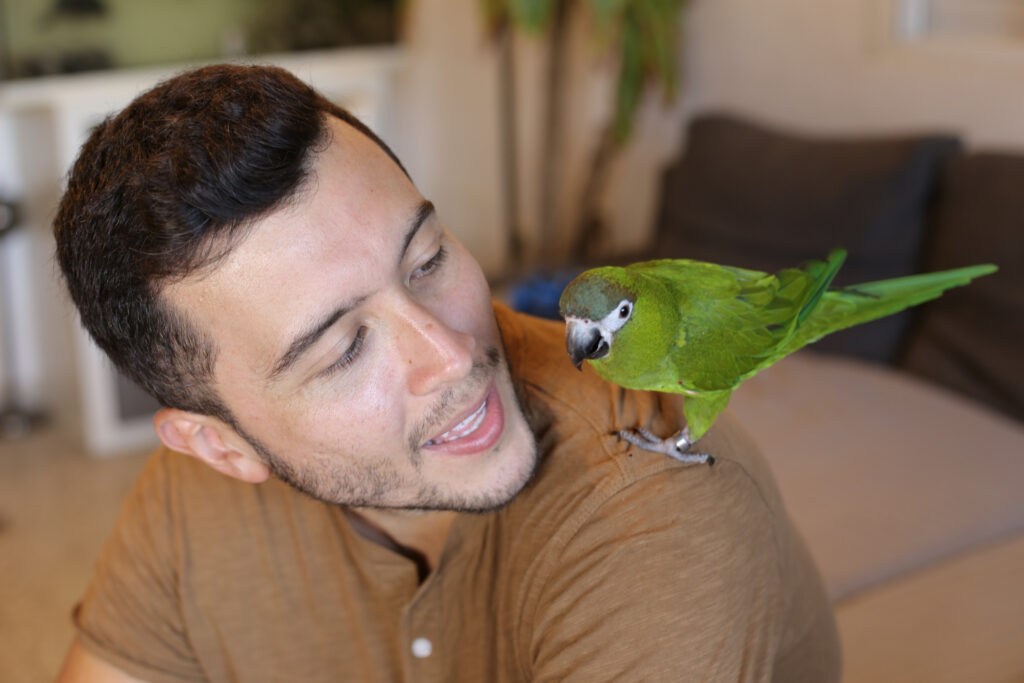
If you’ve ever walked into a bird owner’s home, you might have witnessed a full-blown conversation happening—between a human and their feathered friend. And no, it’s not just about teaching the bird to say “hello” or “pretty bird.” Bird people genuinely talk to their birds as if they’re holding deep, meaningful conversations. They’ll ask their cockatiel if they had a good nap, remind their parrot to use their “inside voice,” or even rant about a bad day at work. The craziest part? The birds often respond in their own way, whether it’s with actual words, squawks, or an approving head bob.
This habit isn’t just an eccentric quirk—it’s deeply rooted in how bird owners bond with their pets. Unlike cats or dogs, birds are incredibly vocal and social creatures that thrive on communication. Many parrots and other intelligent species can even pick up on emotions, responding to their owners’ moods with comforting sounds or affectionate preening. Scientists have found that birds can form strong social connections with their humans, making them more like feathery roommates than traditional pets. So, while talking to a dog might just feel like talking to yourself, chatting with a bird can feel like an actual back-and-forth dialogue—at least in a bird person’s mind.
2. Birds Have More Control Over Their Owners Than the Other Way Around

People who own birds like to think they’re the ones in charge, but ask any bird person, and they’ll eventually admit the truth—birds run the house. A parrot doesn’t care if you’re in an important Zoom meeting; if they want attention, they will scream until they get it. If a cockatiel decides that your earrings are its new favorite toy, good luck ever wearing them in peace again. Bird owners learn to rearrange their entire lives around their tiny feathery overlords, whether that means adjusting meal times, changing how they decorate their home, or even scheduling their daily routine around their bird’s nap schedule.
What makes it even funnier is that birds seem to know just how much power they have. They’ll use their cuteness to get away with bad behavior, act extra sweet when they want a snack, and throw a tantrum if they don’t get their way. Some species, like African greys and macaws, are smart enough to manipulate their owners by learning exactly which sounds, words, or actions will get them what they want. Bird people may think they’re just providing good care, but deep down, they know the truth—they’ve been trained, not the other way around.
3. The Sound of Silence Is Suspicious, Not Peaceful
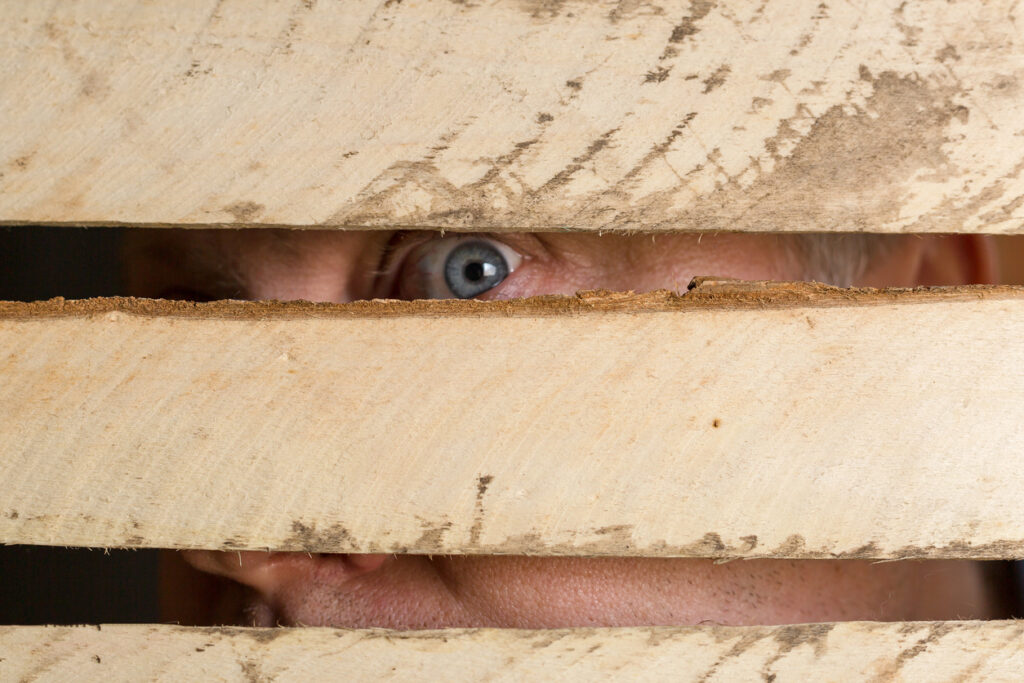
For most people, silence in the house is a sign of calm. For bird owners, silence is a sign of trouble. A quiet bird usually means one of two things: they’re up to something, or they’re sick. If a normally chatty parrot suddenly stops making noise, their owner will drop everything to check on them. Sometimes, they’ll find their bird engaged in suspicious activities, like shredding an important document, sneaking into a cabinet, or chewing on a piece of furniture they shouldn’t be anywhere near. Other times, it’s a real cause for concern, since a silent bird can mean they’re feeling unwell.
This constant need to monitor noise levels turns bird owners into highly attuned creatures themselves. They’ll instinctively react to a change in pitch, volume, or pattern in their bird’s vocalizations, much like a parent reacting to a baby’s different cries. They can tell when a chirp means excitement, when a squawk means annoyance, and when an eerie silence means it’s time to investigate. Non-bird people might think this level of hyper-awareness is a little extreme, but for bird lovers, it’s just another day in the life of being owned by a creature with wings and a mischievous streak.
4. Bird People Will Happily Accept a Messy House for Their Feathered Friends

Anyone who keeps birds as pets quickly learns that having a spotless home is a lost cause. Feathers will float through the air no matter how many times they vacuum, birdseed will find its way into the most unexpected places, and bits of chewed-up paper or wood will litter the floor like confetti after a party. Owning a bird means accepting that cleaning is a never-ending battle, and bird people embrace this reality with a level of patience that seems superhuman to outsiders.
What’s even more fascinating is how bird owners develop a selective blind spot for certain messes. They’ll spend an hour scrubbing the cage, carefully washing the bird’s food bowls, and making sure everything is sanitized—but the second their bird flings a piece of fruit onto the wall, they shrug it off like it’s no big deal. This isn’t because they don’t care about cleanliness; it’s just that they’ve accepted the chaos that comes with bird ownership. Besides, when their feathery companion hops onto their shoulder and nuzzles into their neck, all the mess suddenly feels worth it.
5. Bird People Have an Alarming Tolerance for Ear-Piercing Screeches
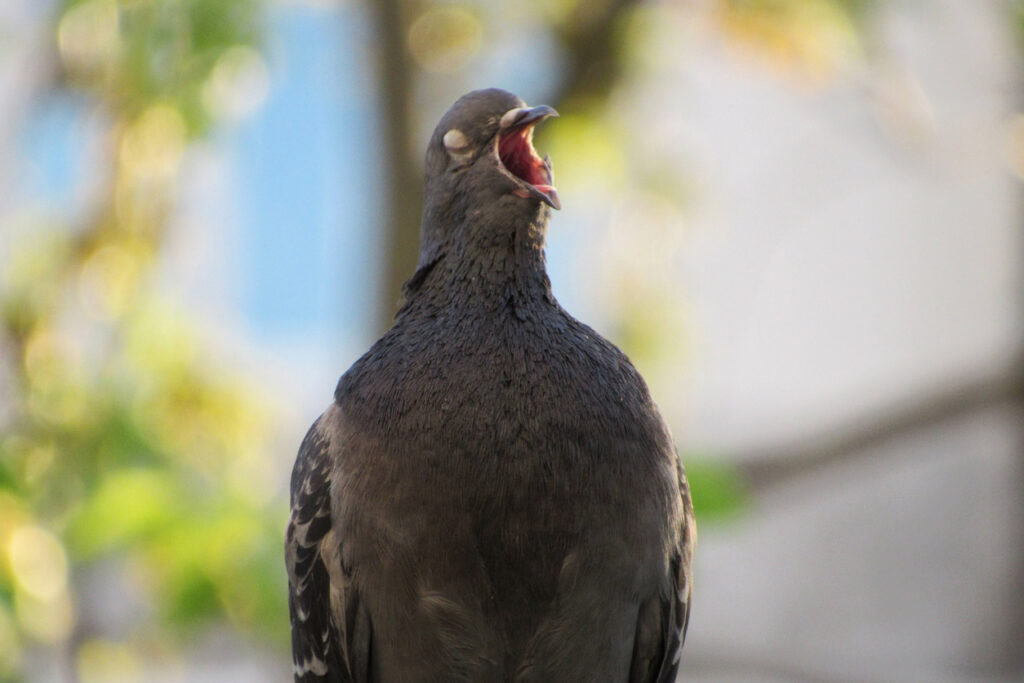
If you’ve ever been in the same room as a parrot throwing a tantrum, you know just how intense their screams can be. Some birds, like cockatoos and macaws, can produce sounds loud enough to rival a jet engine. To most people, this would be unbearable. But for bird owners, it’s just background noise. They’ve built up an impressive level of tolerance for sudden, earsplitting shrieks, and instead of reacting with panic, they just carry on with whatever they were doing.
This doesn’t mean bird people enjoy the noise—they just learn to live with it. They know that birds scream for many reasons: boredom, excitement, frustration, or simply because they can. Instead of getting annoyed, bird owners will calmly talk their feathered friends through their outbursts, distract them with toys, or, in some cases, just accept that their home will never be quiet again. The ability to function normally in an environment filled with random, high-pitched screams is something only true bird lovers can understand.
6. Leaving the House Without a “Goodbye” Is Out of the Question

Bird people don’t just grab their keys and head out the door—they have a whole goodbye ritual that must be followed. Many pet birds expect their humans to announce when they’re leaving, reassure them that they’ll be back, and in some cases, even offer a special farewell phrase. A parrot that usually hears “be good, I’ll see you soon” will wait for that exact phrase every time its owner walks out the door. If the ritual is skipped, expect loud protests.
It’s not just about habit—birds are deeply social animals that form strong bonds with their humans. They need to feel included in everything, even something as small as a departure routine. Many bird owners claim their pets can sense when they’re about to leave and will react accordingly, either by clinging to them or by trying to guilt-trip them with sad chirps. For bird lovers, saying goodbye isn’t just about keeping their pets happy—it’s a sign of respect for their tiny, intelligent companions.
7. No Piece of Jewelry Is Safe from a Bird’s Beak
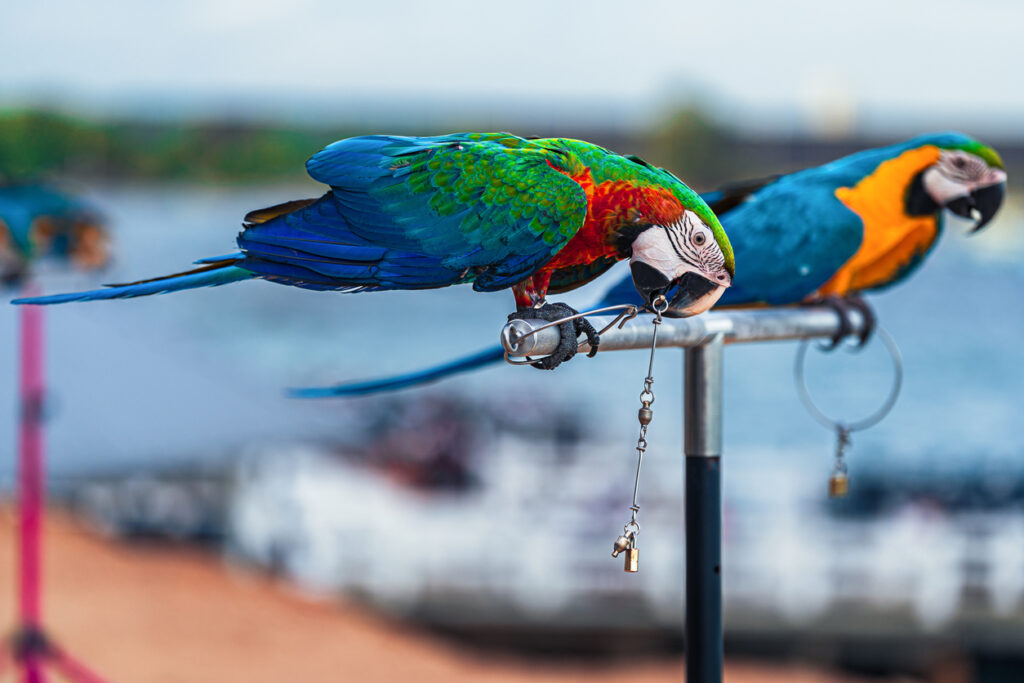
Birds are natural foragers, which means anything shiny, colorful, or dangling is automatically a target. Earrings, necklaces, rings, and even buttons are all fair game. Bird owners quickly learn that wearing jewelry around their pets is a risky move unless they’re willing to have it inspected, nibbled on, or outright stolen. Some birds will gently tap a piece of jewelry with their beak, while others will try to pry it off entirely.
This fascination with shiny objects is adorable at first, but it quickly becomes a battle of wills. Bird owners have had to rescue wedding rings from determined beaks, chase after birds that have flown off with earrings, and even replace chewed-up watch bands. Despite the frustration, most bird lovers find it impossible to stay mad. They know that this behavior is just part of a bird’s natural curiosity, and honestly, who can blame them? After all, jewelry does look like a bunch of fancy bird toys.
8. Every Bird Person Secretly Wonders If Their Bird Actually Likes Them
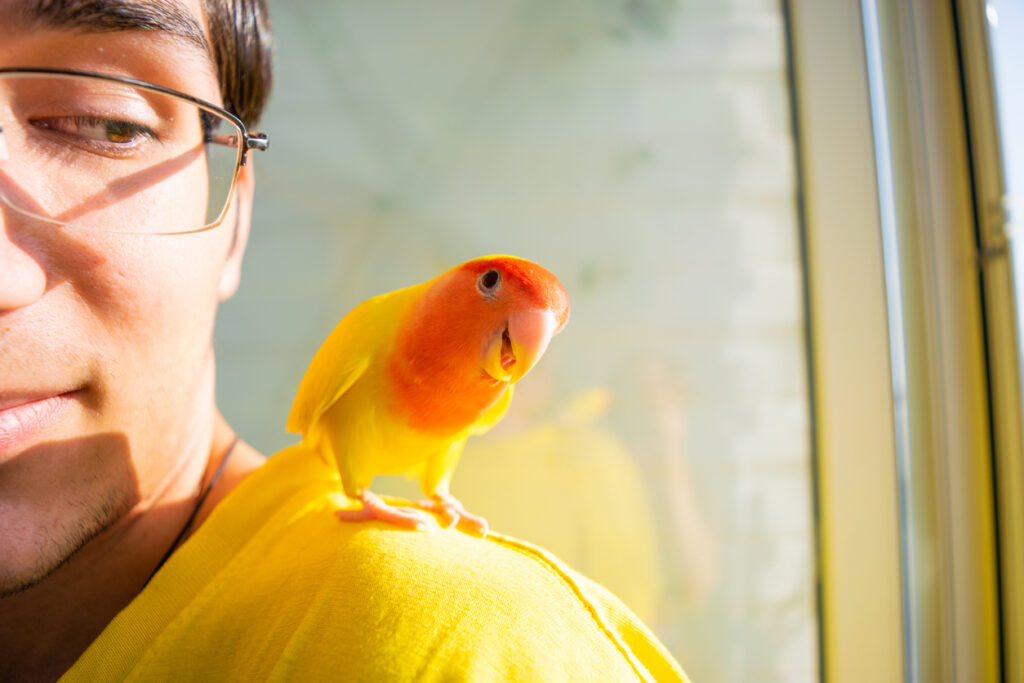
Birds are complicated creatures. One day, they’re affectionate and snuggly; the next, they’re giving their owner the cold shoulder for no apparent reason. This unpredictability leaves many bird lovers constantly questioning where they stand in their pet’s tiny feathery heart. Unlike dogs, who show love openly, birds can be a little more selective. Sometimes, they’ll choose one favorite person and ignore everyone else. Other times, they’ll act sweet until they suddenly decide they’re done with attention and fly away without warning.
This leads to an ongoing internal debate for bird owners: “Does my bird love me, or do they just tolerate me?” The truth is, birds show affection in their own unique ways—preening their owner’s hair, perching on their shoulder, or even just choosing to be near them. But because their moods can change so fast, bird people live in a constant state of self-doubt. In the end, though, they wouldn’t have it any other way. The challenge of earning a bird’s trust makes every moment of affection feel like a hard-won victory.
9. Bird Owners Develop Lightning-Fast Reflexes
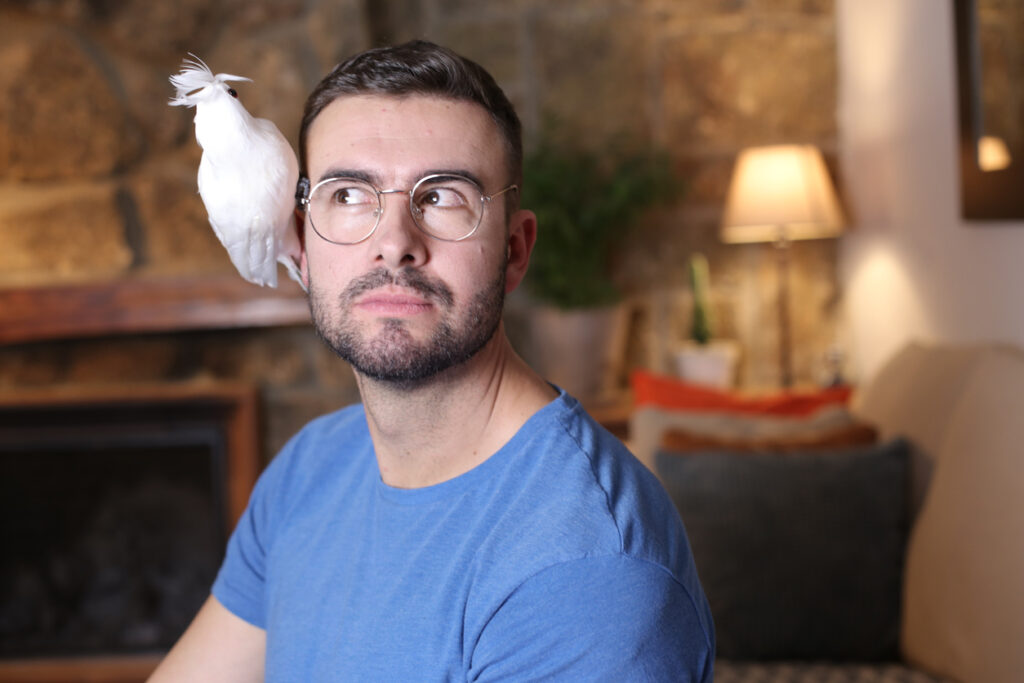
When you live with a bird, you learn to move fast. Birds are tiny, unpredictable, and prone to making sudden, daring escapes. Whether it’s a parrot deciding to launch itself across the room or a cockatiel attempting to land on a moving ceiling fan, bird owners have to be ready at all times. Their reflexes become so sharp that they can catch a falling bird mid-air, snatch an object before it’s stolen, or duck just in time to avoid an unexpected flight path.
It’s not just about reacting quickly—it’s about anticipating chaos before it happens. Bird people develop an almost psychic ability to predict when their pet is about to do something reckless. They’ll spot the subtle shift in body language that signals an incoming flight attempt or sense when a bird is eyeing a forbidden snack. This heightened awareness becomes second nature, turning bird owners into masters of quick thinking and faster hands.
10. Bird People Accept That Their Clothes Will Always Have Feathers on Them
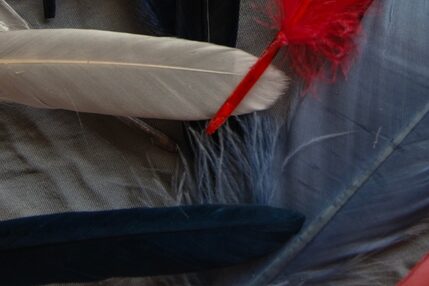
No matter how much they clean, bird owners always carry a little piece of their pet with them—literally. Feathers have a way of sticking to everything, from clothes to furniture to freshly washed hair. Bird people will spend an embarrassing amount of time lint-rolling their outfits before leaving the house, only to discover a stray feather clinging to their shoulder later. It’s just part of the package when you share your home with a creature that constantly sheds.
And it’s not just feathers—bird dust is another unavoidable reality. Certain species, like cockatoos and African greys, produce fine powder to keep their feathers healthy, and it settles on every surface like a layer of fairy dust. While outsiders might find this annoying, bird owners take it in stride. To them, a little extra fluff in their life is just one of the many quirks of loving a bird. After all, if having a few feathers stuck to your sweater is the price to pay for an adorable, talkative companion, it’s a trade worth making.


